-
 Bitcoin
Bitcoin $84,800.7048
2.32% -
 Ethereum
Ethereum $1,882.5584
2.87% -
 Tether USDt
Tether USDt $1.0000
0.01% -
 XRP
XRP $2.0968
-0.03% -
 BNB
BNB $603.2602
-0.62% -
 Solana
Solana $124.5532
-0.44% -
 USDC
USDC $0.9999
-0.02% -
 Dogecoin
Dogecoin $0.1707
1.90% -
 Cardano
Cardano $0.6689
0.47% -
 TRON
TRON $0.2384
0.86% -
 Toncoin
Toncoin $4.0121
-3.28% -
 Chainlink
Chainlink $13.7734
0.97% -
 UNUS SED LEO
UNUS SED LEO $9.4100
2.89% -
 Stellar
Stellar $0.2672
0.86% -
 Avalanche
Avalanche $19.2693
1.92% -
 Sui
Sui $2.3662
2.82% -
 Shiba Inu
Shiba Inu $0.0...01237
-2.05% -
 Hedera
Hedera $0.1657
1.14% -
 Polkadot
Polkadot $4.0848
0.85% -
 Litecoin
Litecoin $82.9308
-0.63% -
 MANTRA
MANTRA $6.2006
-1.38% -
 Bitcoin Cash
Bitcoin Cash $304.9806
0.27% -
 Bitget Token
Bitget Token $4.5883
-0.15% -
 Dai
Dai $1.0001
0.02% -
 Ethena USDe
Ethena USDe $0.9998
-0.01% -
 Pi
Pi $0.6918
-2.64% -
 Hyperliquid
Hyperliquid $13.0896
-1.19% -
 Monero
Monero $218.5433
0.66% -
 Uniswap
Uniswap $6.1491
2.50% -
 Aptos
Aptos $5.2452
-0.95%
How to participate in decentralized finance (DeFi) projects in Trust Wallet?
Trust Wallet acts as a gateway to DeFi, allowing users to securely interact with platforms like PancakeSwap and Uniswap for swapping, staking, and yield farming.
Mar 29, 2025 at 01:42 pm
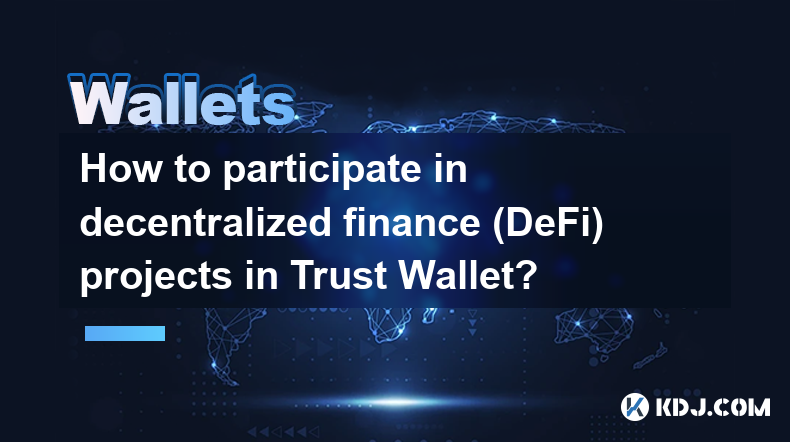
Understanding DeFi and Trust Wallet's Role
Decentralized Finance (DeFi) offers a range of financial services built on blockchain technology, eliminating the need for intermediaries like banks. Trust Wallet, a mobile cryptocurrency wallet, provides a user-friendly interface to access many DeFi platforms. It doesn't directly host DeFi applications but acts as a gateway, securely storing your crypto assets and allowing you to interact with various DeFi protocols. Understanding this distinction is crucial before diving into DeFi activities within Trust Wallet.
Connecting Trust Wallet to DeFi Platforms
Before interacting with any DeFi protocol, you need to connect your Trust Wallet to the platform's decentralized application (dApp). This process typically involves these steps:
- Open the Trust Wallet app and navigate to the DApps browser.
- Find the DeFi platform you wish to use (e.g., PancakeSwap, Uniswap). Ensure you're using the official website or dApp; scams are prevalent.
- Click on the platform's link. The platform will prompt you to connect your wallet.
- Approve the connection request. This grants the dApp access to your wallet's assets. Always double-check the address to prevent malicious connections.
Remember to only connect to verified and reputable DeFi platforms. Always prioritize security and verify the website address.
Navigating Common DeFi Activities within Trust Wallet
Once connected, you can engage in various DeFi activities. The specific steps vary across platforms but generally follow a similar pattern:
Swapping Tokens: This involves exchanging one cryptocurrency for another. Most DeFi platforms offer a user-friendly interface for this. You'll need to select the tokens you want to swap and confirm the transaction. Be mindful of slippage and transaction fees.
Providing Liquidity: This involves contributing assets to a liquidity pool, earning trading fees in return. You'll need to choose a pair of tokens and specify the amount you want to provide. Understand impermanent loss before participating.
Staking: This involves locking up your crypto assets to secure a blockchain network or support a DeFi platform, earning rewards in return. Each platform has its own staking mechanics. Always research the risks and rewards associated with a specific staking program.
Yield Farming: This advanced strategy involves lending or borrowing crypto assets to generate high yields. It typically involves multiple steps and carries higher risks. Yield farming requires a strong understanding of DeFi concepts and risk management.
Lending and Borrowing: DeFi platforms allow users to lend their crypto assets to earn interest or borrow assets against collateral. This requires understanding collateralization ratios and liquidation risks. Borrowing carries the risk of liquidation if the collateral value drops below a certain threshold.
Security Best Practices When Using DeFi in Trust Wallet
Security is paramount in the DeFi space. Here are some crucial steps:
Use a strong password and enable two-factor authentication (2FA) for your Trust Wallet. This adds an extra layer of security to protect your assets.
Only connect your wallet to verified and reputable DeFi platforms. Be wary of phishing websites and scams.
Double-check the contract address before interacting with any DeFi protocol. A single wrong character can lead to significant losses.
Regularly review your transaction history. This helps detect any unauthorized activity.
Keep your private keys secure. Never share your private keys with anyone.
Be cautious about high-yield promises. While DeFi can offer attractive returns, excessively high yields often indicate high risks.
Understanding Gas Fees and Transaction Costs
Transacting on blockchain networks involves gas fees, which are transaction costs paid to miners or validators. These fees can vary depending on network congestion. Always check the estimated gas fees before confirming a transaction to avoid unexpected costs. Gas fees can significantly impact profitability, especially in yield farming and other high-frequency trading activities.
Common Questions and Answers
Q: Is Trust Wallet safe for DeFi?
A: Trust Wallet itself is a secure wallet, but the security of your DeFi interactions depends on the platforms you use and your own security practices. Always prioritize reputable platforms and follow secure practices.
Q: What are the risks of using DeFi in Trust Wallet?
A: Risks include smart contract vulnerabilities, hacks, rug pulls (where developers abandon a project), impermanent loss (in liquidity providing), and market volatility.
Q: Can I use Trust Wallet for all DeFi platforms?
A: Trust Wallet supports many, but not all, DeFi platforms. Check if the platform you want to use is compatible with Trust Wallet's DApp browser.
Q: How do I recover my assets if I lose access to my Trust Wallet?
A: Securely storing your seed phrase is critical. If you lose access and have your seed phrase, you can recover your wallet. Without it, recovery is generally impossible.
Q: What are the benefits of using Trust Wallet for DeFi?
A: Trust Wallet offers a user-friendly interface, supports a wide range of cryptocurrencies, and provides a secure environment for storing your assets. However, remember that Trust Wallet itself doesn't eliminate the inherent risks of DeFi.
Q: What is slippage in DeFi transactions?
A: Slippage refers to the difference between the expected price of a token swap and the actual price at the time the transaction is executed. This is due to market volatility and can lead to less favorable exchange rates.
Q: What is impermanent loss?
A: Impermanent loss is the potential loss incurred when providing liquidity to a decentralized exchange (DEX). It occurs when the price of the assets in the liquidity pool changes significantly compared to when you initially deposited them.
Disclaimer:info@kdj.com
The information provided is not trading advice. kdj.com does not assume any responsibility for any investments made based on the information provided in this article. Cryptocurrencies are highly volatile and it is highly recommended that you invest with caution after thorough research!
If you believe that the content used on this website infringes your copyright, please contact us immediately (info@kdj.com) and we will delete it promptly.
- Mastercard Launches Multi-Token Network (MTN) to Connect Traditional Finance and Digital Assets
- 2025-04-02 10:35:12
- LCX is set to participate in the Paris Blockchain Week, which commences on April 8th in Paris.
- 2025-04-02 10:35:12
- FIO Protocol's head of marketing, Marie Grig, will participate in Paris Blockchain Week
- 2025-04-02 10:30:12
- DTX Exchange (DTX) Token Price Prediction: Will the DTX Presale Ever End?
- 2025-04-02 10:30:12
- Binance's Routine Contract Rule Adjustment Accidentally Exposed the Most Vulnerable Pimple in the Crypto Market
- 2025-04-02 10:25:12
- 3 To 6 Months Old Bitcoin Buyers Have Been Holding Strong Recently, Showing Conviction Not Capitulation
- 2025-04-02 10:25:12
Related knowledge
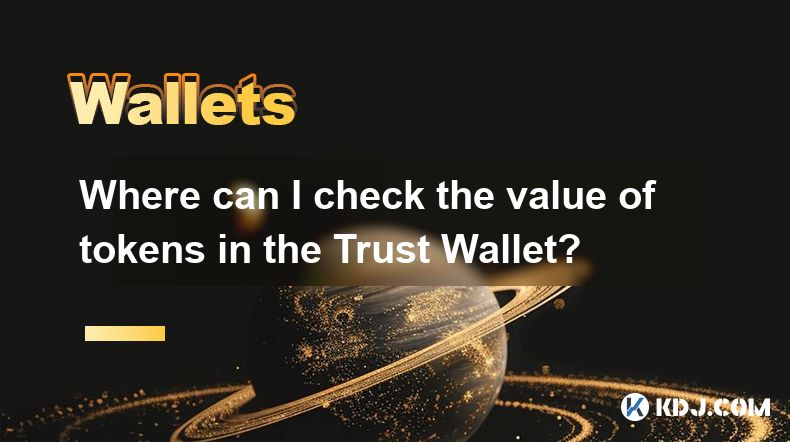
Where can I check the value of tokens in the Trust Wallet?
Apr 02,2025 at 11:14am
When using Trust Wallet, one of the most user-friendly and versatile cryptocurrency wallets available, checking the value of your tokens is a straightforward process. Trust Wallet supports a wide range of cryptocurrencies and tokens, making it a popular choice for both beginners and experienced users in the crypto space. To check the value of your token...
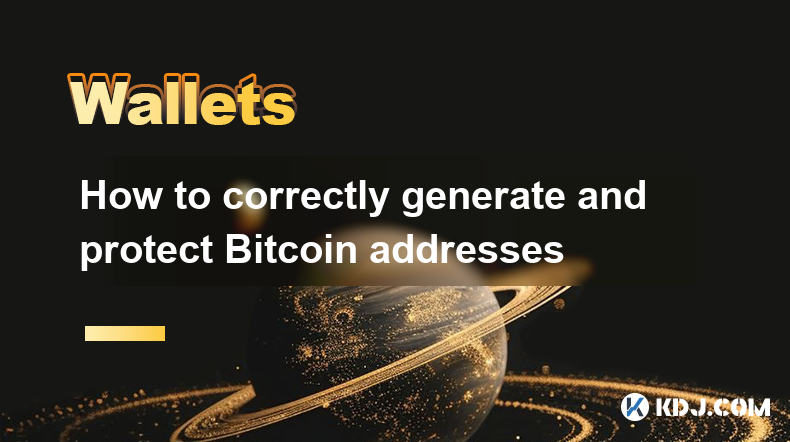
How to correctly generate and protect Bitcoin addresses
Apr 02,2025 at 06:49am
Understanding Bitcoin AddressesA Bitcoin address is like your bank account number. It's a unique identifier that allows others to send you Bitcoin. Unlike a bank account, however, Bitcoin addresses are generated cryptographically and are linked to your private keys. Losing your private keys means losing access to your Bitcoin. Therefore, generating and...
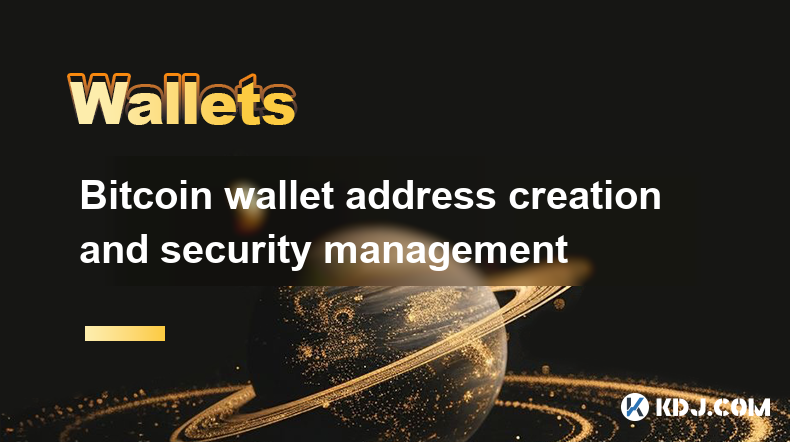
Bitcoin wallet address creation and security management
Mar 31,2025 at 10:56pm
Understanding Bitcoin Wallet AddressesA Bitcoin wallet doesn't store Bitcoin directly. Instead, it stores private keys which are long strings of characters. These keys grant access to your Bitcoin. Your public key, derived from the private key, is used to generate your Bitcoin wallet address, a unique identifier similar to a bank account number. This a...

How to easily generate a Bitcoin payment address
Mar 29,2025 at 10:49am
Generating a Bitcoin payment address might seem daunting, but it's actually quite straightforward. This process is crucial for receiving Bitcoin, as each transaction requires a unique address. Understanding how this works is fundamental to using Bitcoin effectively. This guide will walk you through the simple steps, regardless of your technical experti...
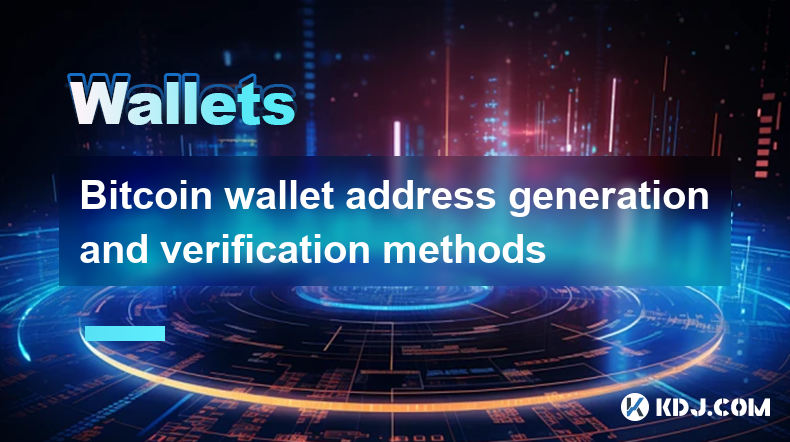
Bitcoin wallet address generation and verification methods
Apr 01,2025 at 11:01am
Understanding Bitcoin Wallet AddressesA Bitcoin wallet address is a unique identifier, similar to a bank account number, used to receive and send Bitcoin. It's a string of alphanumeric characters, crucial for participating in the Bitcoin network. Understanding how these addresses are generated and verified is paramount for secure Bitcoin transactions. ...
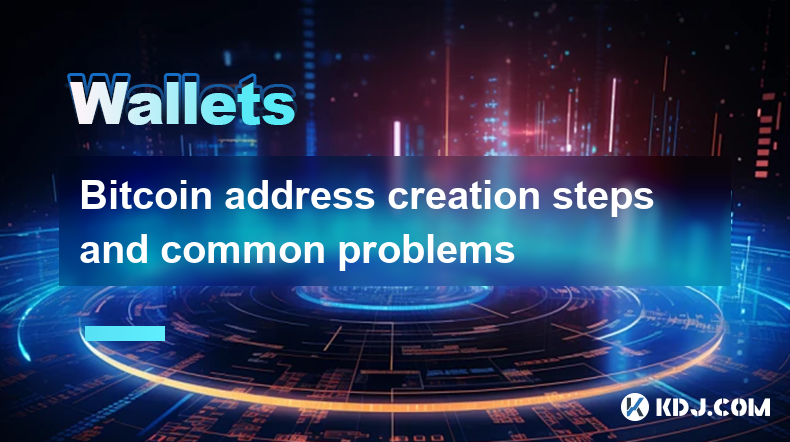
Bitcoin address creation steps and common problems
Mar 30,2025 at 06:07am
Understanding Bitcoin AddressesA Bitcoin address is a unique identifier, similar to a bank account number, used to receive Bitcoin. It's a string of alphanumeric characters generated from a public key, derived from your private key. Understanding the distinction between public and private keys is crucial for Bitcoin security. Your private key should be...

Where can I check the value of tokens in the Trust Wallet?
Apr 02,2025 at 11:14am
When using Trust Wallet, one of the most user-friendly and versatile cryptocurrency wallets available, checking the value of your tokens is a straightforward process. Trust Wallet supports a wide range of cryptocurrencies and tokens, making it a popular choice for both beginners and experienced users in the crypto space. To check the value of your token...

How to correctly generate and protect Bitcoin addresses
Apr 02,2025 at 06:49am
Understanding Bitcoin AddressesA Bitcoin address is like your bank account number. It's a unique identifier that allows others to send you Bitcoin. Unlike a bank account, however, Bitcoin addresses are generated cryptographically and are linked to your private keys. Losing your private keys means losing access to your Bitcoin. Therefore, generating and...

Bitcoin wallet address creation and security management
Mar 31,2025 at 10:56pm
Understanding Bitcoin Wallet AddressesA Bitcoin wallet doesn't store Bitcoin directly. Instead, it stores private keys which are long strings of characters. These keys grant access to your Bitcoin. Your public key, derived from the private key, is used to generate your Bitcoin wallet address, a unique identifier similar to a bank account number. This a...

How to easily generate a Bitcoin payment address
Mar 29,2025 at 10:49am
Generating a Bitcoin payment address might seem daunting, but it's actually quite straightforward. This process is crucial for receiving Bitcoin, as each transaction requires a unique address. Understanding how this works is fundamental to using Bitcoin effectively. This guide will walk you through the simple steps, regardless of your technical experti...

Bitcoin wallet address generation and verification methods
Apr 01,2025 at 11:01am
Understanding Bitcoin Wallet AddressesA Bitcoin wallet address is a unique identifier, similar to a bank account number, used to receive and send Bitcoin. It's a string of alphanumeric characters, crucial for participating in the Bitcoin network. Understanding how these addresses are generated and verified is paramount for secure Bitcoin transactions. ...

Bitcoin address creation steps and common problems
Mar 30,2025 at 06:07am
Understanding Bitcoin AddressesA Bitcoin address is a unique identifier, similar to a bank account number, used to receive Bitcoin. It's a string of alphanumeric characters generated from a public key, derived from your private key. Understanding the distinction between public and private keys is crucial for Bitcoin security. Your private key should be...
See all articles























































































